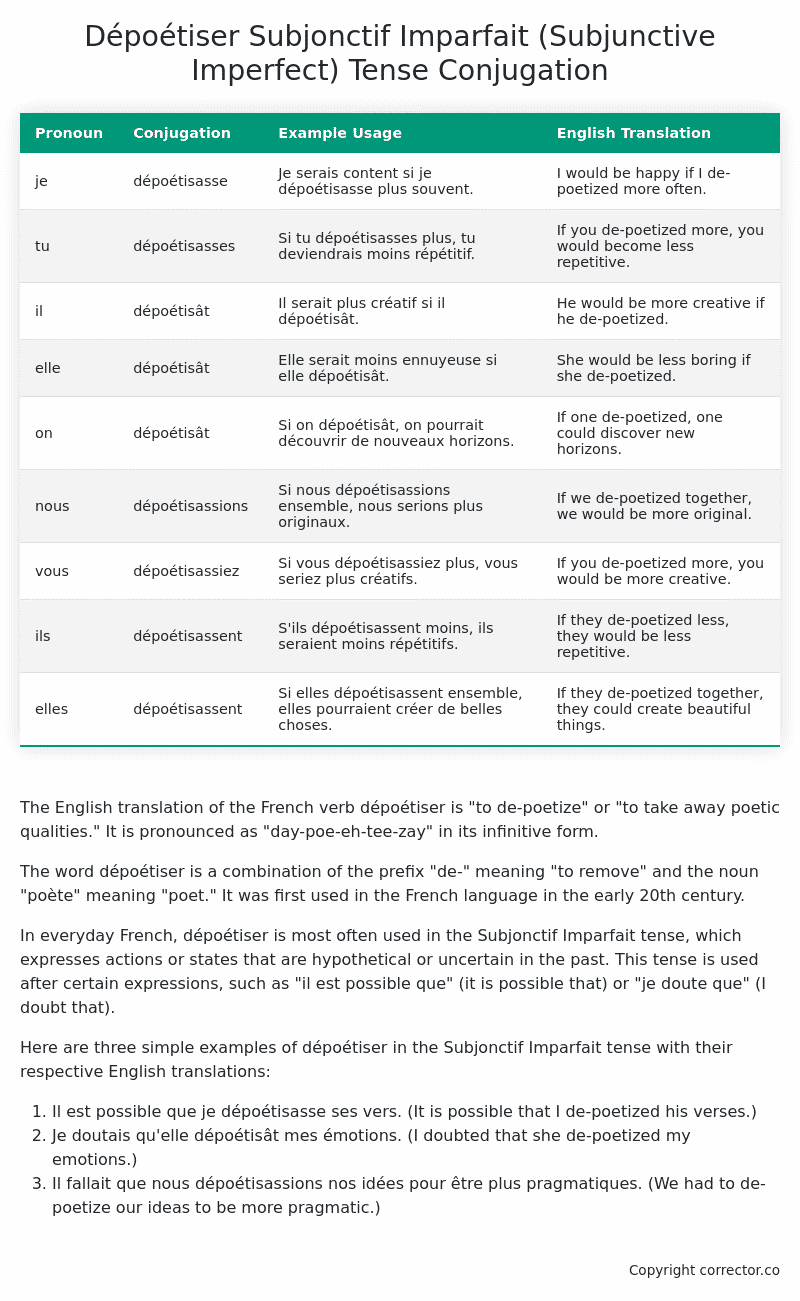Subjonctif Imparfait (Subjunctive Imperfect) Tense Conjugation of the French Verb dépoétiser
Introduction to the verb dépoétiser
The English translation of the French verb dépoétiser is “to de-poetize” or “to take away poetic qualities.” It is pronounced as “day-poe-eh-tee-zay” in its infinitive form.
The word dépoétiser is a combination of the prefix “de-” meaning “to remove” and the noun “poète” meaning “poet.” It was first used in the French language in the early 20th century.
In everyday French, dépoétiser is most often used in the Subjonctif Imparfait tense, which expresses actions or states that are hypothetical or uncertain in the past. This tense is used after certain expressions, such as “il est possible que” (it is possible that) or “je doute que” (I doubt that).
Here are three simple examples of dépoétiser in the Subjonctif Imparfait tense with their respective English translations:
- Il est possible que je dépoétisasse ses vers. (It is possible that I de-poetized his verses.)
- Je doutais qu’elle dépoétisât mes émotions. (I doubted that she de-poetized my emotions.)
- Il fallait que nous dépoétisassions nos idées pour être plus pragmatiques. (We had to de-poetize our ideas to be more pragmatic.)
Table of the Subjonctif Imparfait (Subjunctive Imperfect) Tense Conjugation of dépoétiser
| Pronoun | Conjugation | Example Usage | English Translation |
|---|---|---|---|
| je | dépoétisasse | Je serais content si je dépoétisasse plus souvent. | I would be happy if I de-poetized more often. |
| tu | dépoétisasses | Si tu dépoétisasses plus, tu deviendrais moins répétitif. | If you de-poetized more, you would become less repetitive. |
| il | dépoétisât | Il serait plus créatif si il dépoétisât. | He would be more creative if he de-poetized. |
| elle | dépoétisât | Elle serait moins ennuyeuse si elle dépoétisât. | She would be less boring if she de-poetized. |
| on | dépoétisât | Si on dépoétisât, on pourrait découvrir de nouveaux horizons. | If one de-poetized, one could discover new horizons. |
| nous | dépoétisassions | Si nous dépoétisassions ensemble, nous serions plus originaux. | If we de-poetized together, we would be more original. |
| vous | dépoétisassiez | Si vous dépoétisassiez plus, vous seriez plus créatifs. | If you de-poetized more, you would be more creative. |
| ils | dépoétisassent | S’ils dépoétisassent moins, ils seraient moins répétitifs. | If they de-poetized less, they would be less repetitive. |
| elles | dépoétisassent | Si elles dépoétisassent ensemble, elles pourraient créer de belles choses. | If they de-poetized together, they could create beautiful things. |
Other Conjugations for Dépoétiser.
Le Present (Present Tense) Conjugation of the French Verb dépoétiser
Imparfait (Imperfect) Tense Conjugation of the French Verb dépoétiser
Passé Simple (Simple Past) Tense Conjugation of the French Verb dépoétiser
Passé Composé (Present Perfect) Tense Conjugation of the French Verb dépoétiser
Futur Simple (Simple Future) Tense Conjugation of the French Verb dépoétiser
Futur Proche (Near Future) Tense Conjugation of the French Verb dépoétiser
Plus-que-parfait (Pluperfect) Tense Conjugation of the French Verb dépoétiser
Passé Antérieur (Past Anterior) Tense Conjugation of the French Verb dépoétiser
Futur Antérieur (Future Anterior) Tense Conjugation of the French Verb dépoétiser
Subjonctif Présent (Subjunctive Present) Tense Conjugation of the French Verb dépoétiser
Subjonctif Passé (Subjunctive Past) Tense Conjugation of the French Verb dépoétiser
Subjonctif Imparfait (Subjunctive Imperfect) Tense Conjugation of the French Verb dépoétiser (this article)
Subjonctif Plus-que-parfait (Subjunctive Pluperfect) Tense Conjugation of the French Verb dépoétiser
Conditionnel Présent (Conditional Present) Tense Conjugation of the French Verb dépoétiser
Conditionnel Passé (Conditional Past) Tense Conjugation of the French Verb dépoétiser
L’impératif Présent (Imperative Present) Tense Conjugation of the French Verb dépoétiser
L’infinitif Présent (Infinitive Present) Tense Conjugation of the French Verb dépoétiser
Struggling with French verbs or the language in general? Why not use our free French Grammar Checker – no registration required!
Get a FREE Download Study Sheet of this Conjugation 🔥
Simply right click the image below, click “save image” and get your free reference for the dépoétiser Subjonctif Imparfait tense conjugation!

Dépoétiser – About the French Subjonctif Imparfait (Subjunctive Imperfect) Tense
Formation
Common Everyday Usage Patterns
Interactions with Other Tenses
Subjonctif Présent
Indicatif Passé Composé
Conditional
Conditional Perfect
Summary
I hope you enjoyed this article on the verb dépoétiser. Still in a learning mood? Check out another TOTALLY random French verb conjugation!


